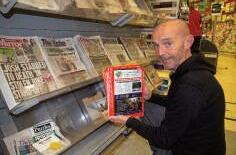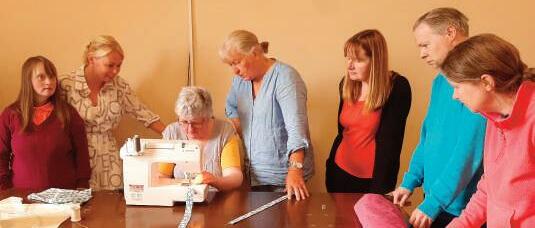IRD Duhallow Progress Jun 21/22.qxp_Layout 1 21/07/2022 12:52 Page 16
2021 - 2022
IRD DUHALLOW | PROGRESS REPORT
Social Farming Duhallow Social Farming IRD Duhallow was delighted to secure funding from the Department of Agriculture, Food and the Marine this year to develop a social farming programme for the Duhallow region. Social farming offers people with disabilities the opportunity to spend time on a family farm, taking part in day-to-day farm activities. Participants go to the host farm once a week for 24 hours on average. A range of activities take place on our host farms, from feeding and checking in on animals, to planting and growing vegetables and plants. Of course, the most important job on all our host farms is the cup of tea before home time!
IRD Duhallow held an information session last November which aimed to inform farmers on the concepts of social farming.
the farm in the context of rural community life and networks. A wraparound approach underpins the Social Farming Project and acts as a gateway for participants and the farm families by improving their access to numerous supports/services through the integrated suite of programmes operated within the local development company structures. Information of the supports offered within IRD Duhallow is included in the introductory pack for host farmers and participants. For participant’s families, information on Duhallow Carer’s group is also given. The social farming facilitator encourages uptake and access to these services and supports.
Social farming facilitator Sheila Kelleher with Kanturk mart manager Seamus O’Keeffe & Colette O’Connell at the social farming outreach day at Kanturk Mart in May.
Duhallow Social Farming operates as a voluntary model to enable real working relationships and friendships to develop. The programme adapts to each host farm environment and the needs of each individual participant. Host farms are supported with any maintenance and on-farm safety improvements, as well as access to relevant training opportunities.
Testimony - Michael & Peggy Lynch, Host Farmers Michael and Peggy Lynch have a sucker farm in Ballingeary, Co. Cork. They have two miniature ponies, two pygmy goats and three dogs. Michael and Peggy have four daughters: Caitriona, Roisin, Aoife and Aisling. The family have welcomed Louise, Martin and Nora from COPE foundation along with their support worker Cathy to the farm.
Benefits of Social Farming
IRD Duhallow STRIVE participant Kevin O'Connor painting a fence at Kate Jarvey's social farm in Kanturk. Kevin works on the farm three hours a week and was matched with Kate because of his love for horses and nature.
Social farming creates the opportunity for farmers to reconnect with their local communities by opening their farms as part of a social support system. The Social Farming programme can improve the farm work environment, with the participant providing the farmer with help and company. Social farming will give farmers a better understanding of disabilities, as well as giving them an opportunity to access relevant training and upskilling courses. Farm improvements are another benefit for farmers, with IRD Duhallow assisting with on-farm health and safety upgrades for social farming activities.
Peggy told us why they decided to get involved in social farming: “My husband Michael and I wanted to do something to help people in need. We discovered IRD Duhallow were doing this social farming programme and I knew in my heart straight away this was the perfect opportunity for us. We contacted IRD Duhallow and now have three participants from COPE foundation coming to our farm and we absolutely love them. They’ve become part of our family, part of our week and part of our lives. We love seeing their smiles and hearing their jokes and laughter. It’s in giving you receive, and I would highly recommend social farming to everyone”.
Social Farming activities focus on the participant’s potential and encourages them to socialise, aiding in the development of their life and social skills. The new challenges and experiences participants encounter while social farming improves their confidence, independence and wellbeing. The increased activity improves their physical health and develops their motor skills.
Training Opportunities All our host farmers participated in the ‘FARCURA - An Introduction to Social Farming’ course to acquaint them to the concepts of social farming and prepare them with the skills to take on participants. The training empowered farmers with the necessary knowledge, skillsets and competencies to develop and enhance social farming.
COPE participants Nora McCarthy, Louise Hogan & Martin Condon with host farmers Peggy & Aoife Lynch.
Duhallow Social Farming provided funding for host farmers to complete the PHECC First Aid responder training. Our farmers have also completed the HSE Safeguarding Vulnerable Adults training to equip them with the knowledge needed if a safeguarding concern arises. IRD Duhallow integrated supports Social farming is not just about individual participants or individual farms, but about these individuals as part of their community, and the role of
COPE attendee Nora McCarthy feeding the goats with host farmer Aoife Lynch.
16
Martin Condon sowing gladioli bulbs - we can't wait to see his beautiful flowers grow at the Lynch social farm!




































